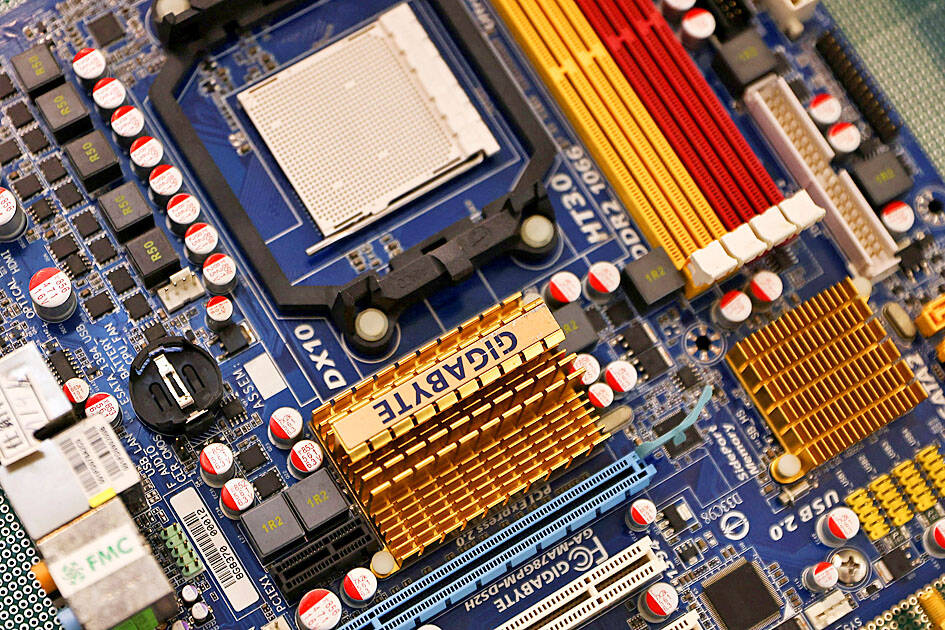Vanguard International Semiconductor Corp (世界先進) yesterday said revenue this quarter would drop by about 15 percent from last quarter, as customers digest inventory amid sluggish demand for consumer electronics during the slow season.
Vanguard, which makes driver ICs used in displays and power management chips, joined its global peers in giving a bleak outlook for the current quarter.
Revenue is expected to fall for a third consecutive quarter to between NT$7.9 billion and NT$8.3 billion (US$259.7 million and US$272.9 million) this quarter, compared with NT$9.57 billion the previous quarter, Vanguard said.

Photo: Ann Wang, Reuters
Its factory utilization rate is expected to fall by 10 percentage points this quarter, as customers continue to scale down orders, the chipmaker said.
The expected decline does not fully reflect the extent of an industry slump, as Vanguard has allocated a small part of its manufacturing capacity to help customers “pre-build” chip inventory for shipments at a later date.
Gross margin is expected to slide to 29 to 31 percent this quarter, from 39.2 percent last quarter, approaching the lowest level since the first quarter of 2020, the company said.
Falling average selling prices are also weighing on gross margin this quarter, the chipmaker said.
“We are working with customers to deal with the severe inventory correction cycle, as end-product market demand is depressed by the macroeconomic situation,” Vanguard chairman Fang Leuh (方略) told an online investors’ conference.
“The first quarter should be the coolest season as indicated by macroeconomy and customers’ expectations. That will be followed by a gradual recovery, but we are not clear how fast the recovery will be,” he said.
Vanguard said that it has seen inventory pressure mainly from driver ICs used in notebook computer displays, power management chips and industrial segments, such as data centers.
Driver ICs used in TV displays are expected to hit the bottom this quarter, it said.
Power management chips contributed 78 percent to Vanguard’s revenue last quarter.
In response to the slowdown, Vanguard halved its capital expenditure this year to about NT$10 billion, from NT$19.4 billion last year, by postponing the delivery of some new manufacturing equipment.
More than half of the capital expenditure would be allocated to building a new fab, Fab 5, and boosting wafer capacity there, the chipmaker said.
Vanguard would carry out its capacity expansion plans despite the industrial downturn, as it is obligated to supply wafers to customers based on long-term agreements signed before market sentiment soured.
The investment would help boost its manufacturing capacity by 8 percent this year from last year, the chipmaker said.
Vanguard said it is evaluating the possibility of investing in a new 12-inch factory to satisfy customers’ long-term demand for wafers.
Cost inefficiency makes it infeasible to invest in another 8-inch fab, it said.
Vanguard operates five 8-inch fabs.

TAKING STOCK: A Taiwanese cookware firm in Vietnam urged customers to assess inventory or place orders early so shipments can reach the US while tariffs are paused Taiwanese businesses in Vietnam are exploring alternatives after the White House imposed a 46 percent import duty on Vietnamese goods, following US President Donald Trump’s announcement of “reciprocal” tariffs on the US’ trading partners. Lo Shih-liang (羅世良), chairman of Brico Industry Co (裕茂工業), a Taiwanese company that manufactures cast iron cookware and stove components in Vietnam, said that more than 40 percent of his business was tied to the US market, describing the constant US policy shifts as an emotional roller coaster. “I work during the day and stay up all night watching the news. I’ve been following US news until 3am

Six years ago, LVMH’s billionaire CEO Bernard Arnault and US President Donald Trump cut the blue ribbon on a factory in rural Texas that would make designer handbags for Louis Vuitton, one of the world’s best-known luxury brands. However, since the high-profile opening, the factory has faced a host of problems limiting production, 11 former Louis Vuitton employees said. The site has consistently ranked among the worst-performing for Louis Vuitton globally, “significantly” underperforming other facilities, said three former Louis Vuitton workers and a senior industry source, who cited internal rankings shared with staff. The plant’s problems — which have not

TARIFF CONCERNS: The chipmaker cited global uncertainty from US tariffs and a weakening economic outlook, but said its Singapore expansion remains on track Vanguard International Semiconductor Corp (世界先進), a foundry service provider specializing in producing power management and display driver chips, yesterday withdrew its full-year revenue projection of moderate growth for this year, as escalating US tariff tensions raised uncertainty and concern about a potential economic recession. The Hsinchu-based chipmaker in February said revenues this year would grow mildly from last year based on improving supply chain inventory levels and market demand. At the time, it also anticipated gradual quarter revenue growth. However, the US’ sweeping tariff policy has upended the industry’s supply chains and weakened economic prospects for the world economy, it said. “Now

COLLABORATION: Given Taiwan’s key position in global supply chains, the US firm is discussing strategies with local partners and clients to deal with global uncertainties Advanced Micro Devices Inc (AMD) yesterday said it is meeting with local ecosystem partners, including Taiwan Semiconductor Manufacturing Co (TSMC, 台積電), to discuss strategies, including long-term manufacturing, to navigate uncertainties such as US tariffs, as Taiwan occupies an important position in global supply chains. AMD chief executive officer Lisa Su (蘇姿丰) told reporters that Taiwan is an important part of the chip designer’s ecosystem and she is discussing with partners and customers in Taiwan to forge strong collaborations on different areas during this critical period. AMD has just become the first artificial-intelligence (AI) server chip customer of TSMC to utilize its advanced